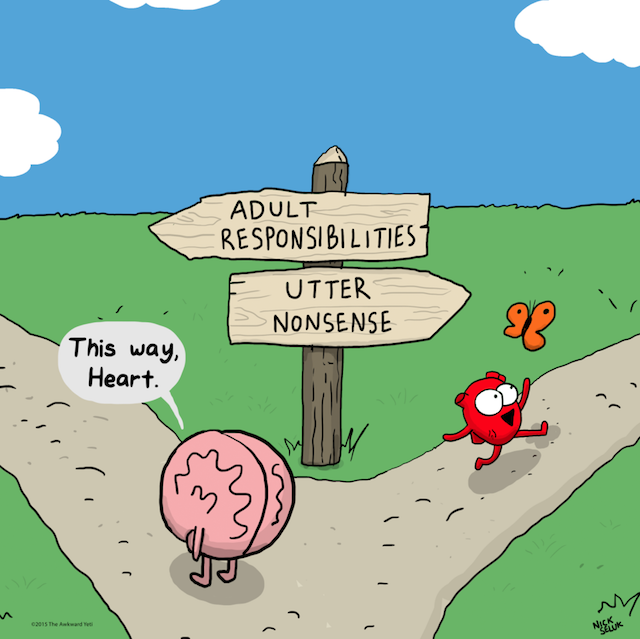
I was sober for over 27 years, and proud of it.
I’m 30 now, and I must tell you that people couldn’t believe I hadn’t become an addict sooner.
When people met me they were skeptical. Some teased me. They said I’d come around sooner or later.
It was inevitable I’d become an addict—and one day, I did.
I guess you could say I became an addict out of necessity—a necessity to be more aware of the world; to be connected. The drug was too good and it was completely legal. Almost everyone was doing it and if you weren’t, you were missing out or a little nuts.
Before the drug everyone would say, “You have no idea how much better this is!” as they clutched onto their own empty promises. “I don’t need it to function,” I’d say back, unsure if I was really missing out or if my truth in that moment was stronger than their convictions.
But then it happened. I purchased the drug. At first, I only used it sparingly, out of necessity. I didn’t buy a lot of it, just enough to get by. Plus, at that point the drug was cheap and readily available. I felt like I was one of the last people to buy into it, which gave me a vague sense of pride.
I keep telling myself that I’m not like most of the users I’ve seen clutching the drug, re-upping every minute, losing themselves in a world so narrow it’s frightening. I do things like try to keep the drug in my pocket, because I read somewhere that it depresses people if they see you using it. I never ever use the drug when I’m with company because I read somewhere else that when two people are together and on the drug, it’s like being alone together.
Sometimes I feel I’m the least addicted out of all the addicts, but I know myself, and if I’m being honest, I am undoubtedly addicted to my iPhone and laptop and the internet.
I know this because I miss my old self terribly.
I miss the long stretches of uninterrupted mental space. I miss just being with myself—not relying on a screen to navigate the streets of Washington, D.C. or the urge to google every fact that comes to my mind or scrolling through endless websites fill my mind up with nothing.
So maybe I’ll try to stop being an addict. Maybe today, I’ll turn off the drug for a few hours.
Maybe.
In the end, we are the masters of our own universe. Let’s take our power back from the mindless (and often times neurotic) tendencies we’ve adapted from technology. Here are a few tips I’ve learned from creatives, experts and my own musings that can set us up for success. I’d love to hear your own tips and tools so please add them in the comments section!
>> Understand how often you check your phone.
Free apps like Checky give you a raw number of how often you turn on or sign into your phone. Once I downloaded it, I thought twice every time I reached for it.
>> Assign times of the day for certain tasks.
Just like we manage our time in other areas of our lives, we can identify, write down and stick to certain times of day when we check email or social media. I use Facebook for business, so I check and use it twice per day—that’s it. Tim Ferriss and other creatives say checking email only once per day frees up time to concentrate and be productive on creating actual results.
>> Remove your phone from specific spaces.
Out to dinner? Going for a run? Sleeping? Keep your phone at home, in your bag on silent, or in another room completely. Try going to dinner and having your phone away for three hours. Go to the gym or go for a walk outside and leave the phone at home. Or do as Arianna Huffington does: escort your phone out of the bedroom when you’re going to sleep.
Starting today, pick one scenario where you can leave your phone out of the conversation!
>> Delete apps that are distractions.
I deleted Facebook and Snapchat from my phone, and it was the best thing I’ve done. What’s one app you can delete today that is a mindless time-suck?
>> Ask yourself regularly: Am I using this technology for a purpose or is it just for entertainment?
I use Facebook for business, am a writer and freelancer, and I travel frequently. The internet is a tool for me to get paid and do what I love! Therefore, I fight to spend as little time as possible being entertained by the internet and to spend most of the hours doing work, being productive and genuinely learning.
How can you use the internet for a greater purpose? What kind of entertainment is useful versus the kind that takes you away from your life?
I bid us all good luck.
Relephant:
How Breaking Free from Technology can Improve our Social Lives.
Author: Tracey Livingston
Image: The Awkward Yeti
Eleprentice Editor: Tess Drudy; Editors: Toby Israel & Emily Bartran
 Share on bsky
Share on bsky




Read 0 comments and reply